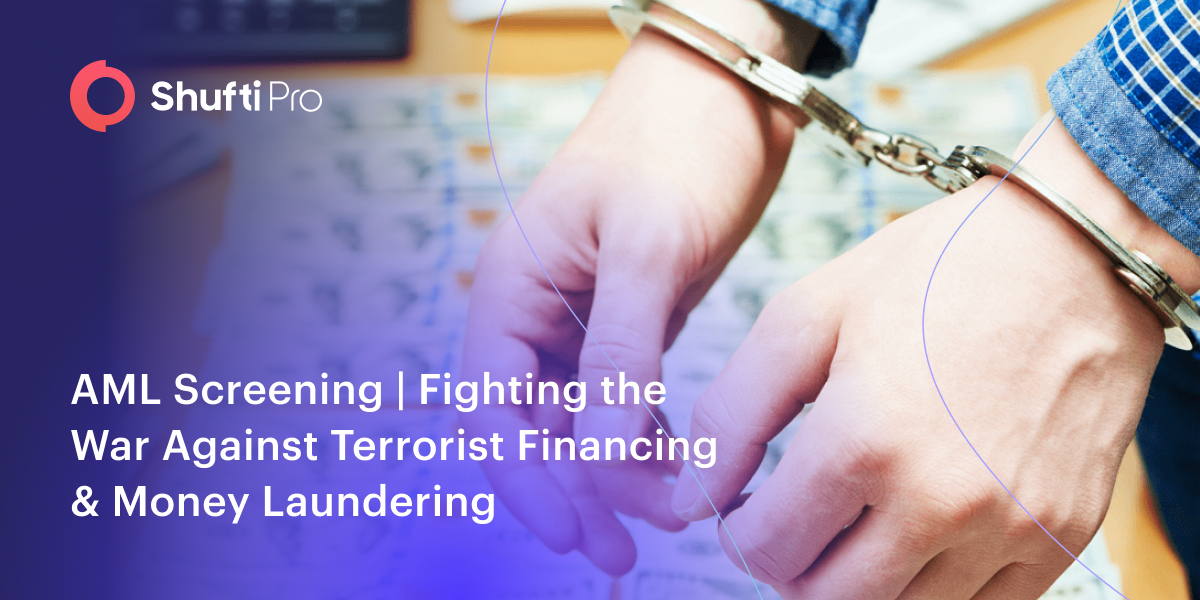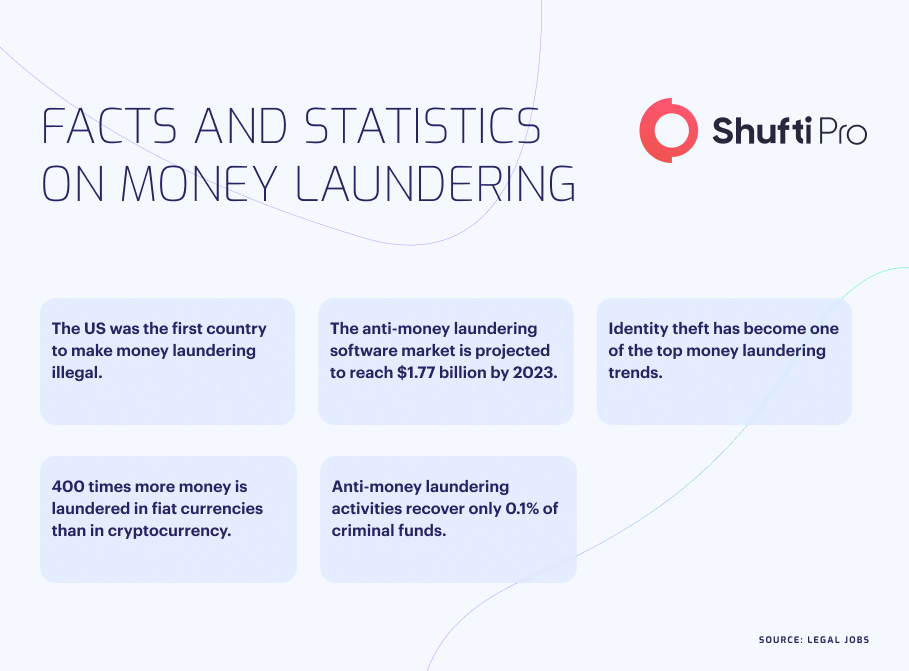AML Screening | Fighting the War Against Terrorist Financing & Money Laundering

Money laundering and terrorist financing have become a global concern. In the US alone, approximately $300 billion is laundered annually, whereas according to the United Nations key findings, around $800 to $2 trillion is being illegally circulated globally. Money laundering facilitates fraudsters in spending their illicit gains in the legal financial system, enabling them to continue their criminal activities. Perhaps, most importantly, money laundering reduces the governments’ tax revenue, which affects wider economies and public services.
However, these circumstances are enough for governments to take incentives for preventing, detecting, and stopping money laundering activities – which is why law enforcement authorities, financial watchdogs, and governments have developed and enforced anti-money laundering regulations. Whilst helping law enforcement authorities to ensure effective enforcement, Fintech companies are coming up with automated AML solutions that are must-haves for businesses operating in high-risk jurisdictions or prone to money laundering – such as the financial, crypto, and real estate sectors.
What is AML Screening?
Anti-money laundering (AML) screening is a process through which businesses can determine high-risk entities and money laundering risks their customers pose. Additionally, during the customer identity verification for new account opening, AML screening plays a crucial role, allowing companies to screen clients against multiple sanction lists and financial crime databases to determine that they are not harmful to the business.
It’s significant to note that only screening customers doesn’t fulfil the anti-money laundering requirements businesses must stay put with. A comprehensive AML compliance program includes transaction monitoring, a risk-based approach, risk assessment, and ongoing monitoring.
How Does AML Screening Work?
The anti-money laundering screening process varies from business to business. However, when a client appears to open an account, they must provide the essential information and proof of identity to verify themselves.
In addition to gathering customers’ personally identifiable information, financial institutions must also determine the money laundering or terrorist financing risk their customers pose. To resolve this, banks and other financial institutions cross-check and screen customers’ provided information against government databases, sanction lists, watchlists and adverse media.
However, in case a lenient person appears in one of the lists, financial firms should flag and should not onboard. For instance, if the customer is present in one of the lists and has a history of financial crimes, onboarding such a client will affect the business adversely, leading to sanctions, hefty fines and reputational damages.
Other than this, taking the example of a politically exploited person, the financial firm has the choice of onboarding or rejecting the application. If the institution makes the decision to allow them to open an account, the business must come up with a plan for ongoing AML monitoring, which should be more rigid than that of low-risk customers.
AML Checklist – What Your Business Needs to Know
To meet the anti-money laundering compliance obligations and to design a fool-proof AML program, here are the top five key attributes businesses need to have in place:
- Designate a compliance officer
- Develop and constitute in-house AML policies
- Train employees and arrange AML workshops
- Onboard an independent or third-party reviewer
- Develop and practise risk-based procedures to conduct customer due diligence and enhanced due diligence

The Fight Against Money Laundering and Terrorist Financing
After the World Trade Centre tragedy, the intelligence agencies were exposed due to their ineffective security controls and failure to stop 9/11. At that time, money launders and terrorist financiers used advanced and sophisticated money laundering channels to fund the operation. Therefore, in response to this incident, the American intelligence departments developed and adopted Counter-Terror Financing (CTF) measures to eliminate the risk of money laundering and terrorist financing. Like the US’s regulatory authorities, CFT and AML compliance measures have also gained the attention of international financial regulatory authorities, which include the International Monetary Fund (IMF), the United Nations Office on Drugs and Crime (UNDOC) and the European Union (EU). These financial watchdogs regulate the global financial system by developing a unified AML and CFT framework, aiming to make global economies risk-free.
According to the Financial Action Task Force (FATF), money laundering is defined as criminal proceeds camouflaged as illegal means. Generally, organised crimes and militant groups launder money to make their illicit gains legal. However, terror financing is opposite to conventional means of money laundering activities. It starts with investing legitimate money to carry out terror attacks.
Why Mitigating Terrorist Financing is an EU Priority
Money laundering and terrorist financing are the EU’s top significant concerns, and the financial institutions and regulatory authorities are trying to nullify the risk of such crimes. Since 2018, the EU has established more robust AML controls for member countries. The laws make it hard for criminals to carry out money laundering activities and strengthen AML checks, specifically for high-risk jurisdictions.
However, the regulatory authorities continue to enhance the laws to overcome the emerging risks, including:
- Cryptocurrencies and NFTs
- Increasing financial flow across industries
- The complex nature of terrorist activities
- The enhancing ability of criminals to manipulate financial systems
EU’s Action Plan on Fighting Terrorist Financing
Back in December 2019, the European Council adopted strategic priorities to enhance the EU’s AML framework, further enhancing the effectiveness to fight increasing crimes.
In 2020, the commission followed up with its action plan and set more rigid counter-terrorist financing measures for the upcoming years to impose AML rules. On 5 November 2020, the EU adopted conclusions on AML and CFT, which acted as a guide, setting up:
- A single rule book unifying European Unions AML/CFT rules
- An EU-level supervisor with direct supervisory powers
- Obligation for national financial intelligence units to coordinate and share information regarding proceeds of crimes.
EU Anti-Money Laundering Legal Framework
The European Union has come up with six variants of anti-money laundering directives. The Fifth anti-money laundering directive was enforced in June 2018, aiming to:
- Increase transparency in the ownership of companies
- Further, enhance AML/CFT checks on high-risk countries
- Address money laundering and terrorist financing risks linked to cryptocurrencies and prepaid cards
- Uplift measures to cooperate and exchange information among regulatory authorities and the central bank
FATF’s Global Efforts in Combating Terrorist Financing
Since 2021, countering terrorist financing has been the first and foremost priority of the Financial Action Task Force (FATF). However, in 2015, the nature and scope of terrorist risks were intensified globally, with multiple terror attacks in various countries worldwide. The terrorist threat was linked to prominent organised crime organisations including the Levant (ISIL/Da’esh), and by Al-Qaeda and their affiliated terrorist organisations.
Since then, the terrorist attacks continue to evolve, from large organsied crime organisations to terrorist fighters and right-wing extremists. However, the illicit flow of funds across borders provides such organistions to carry out crimes. These rising concerns gained FATF’s attention. In the fight against money laundering and terrorist financing, the FATF plays a pivotal role. The watchdog is making generous efforts in combating terrorist financing through developing and setting global CFT and AML standards, helping governments enforce provisions of the United Nations Security Council resolutions on terrorism whilst evaluating jurisdictions’ control systems to determine their capacity to identify, eliminate and prosecute the proceeds of crimes. Yet many countries are not aligned with FATF’s laws and regulations as they don’t understand the intensity of crime or the risk associated with terrorist financing – in the worst case, they have no means to fight them.
Anti-Money Laundering Screening with Shufti
Navigating anti-money laundering compliance is not an easy task for businesses, as the regulatory landscape keeps on evolving. Screening customers whilst determining the money laundering and terrorist financing risk manually is ineffective and error-prone. To meet the rapidly changing AML and CFT regime whilst screening clients against global financial crime databases in real-time requires automated money laundering solutions.
Shufti, a full-scale identity verification service provider, offers fully-automated, built-in-class anti-money laundering screening service that helps businesses stay put with the global AML compliance, screen customers against 1700+ watchlist and mitigate the risk of crimes – all under one platform within seconds with 99.77% accuracy.
Facing challenges in meeting global AML compliance whilst determining the high-risk entities?











